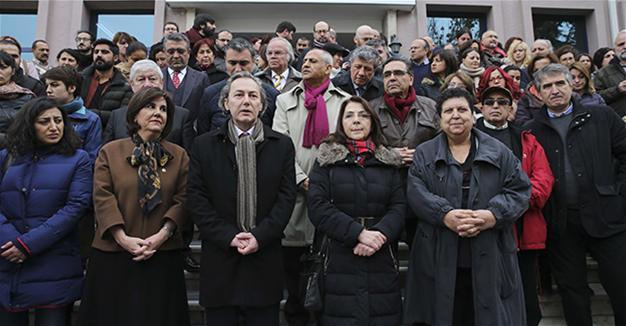Lists of expelled academics were prepared by their universities: Turkey’s Higher Education Board
ANKARA

AA photo
The lists of academics expelled with the latest state of emergency decree on Feb. 7 was prepared by their own universities, Turkey’s Higher Education Board’s (YÖK) press adviser has said after the board received harsh criticism from opposition groups and the scholars themselves.“The entire process on expulsions is controlled by universities. Universities prepare the list and YÖK does not track that,” Şener Aslan told BBC Turkish service on Feb. 8, adding that the expulsion of even one academic was excessive and intractable for them.
“The expulsion of even one academic is too much for us. I wish they never took place,” he said.
Answering a question on why the board had not released a statement after the expulsions, Aslan said it was not possible for them to comment on each decision.
“Investigations into terrorist organizations are being conducted in universities. The names affected by the state of emergency decrees are determined by their own universities. These universities carry out examinations and investigations and order the dismissals, suspensions and expulsions. As YÖK, we decided that universities should handle these processes, because they know the academics the best. We cannot know the truth of the allegations on academics when the case comes to us,” he added.
Saying that the expulsions should be carried out based on documents, Aslan noted that “the people should be known.”
“Because of this, as YÖK, we’ve decided that all processes should be made solely by universities, which has been going on this way for some time. We cannot release a statement on why each person was expelled. If people have objections, they can apply to their universities,” he added.
Aslan said the expulsions were carried out with the approval of commissions in universities and not by the sole decision of the rector.
“As part of the law, a commission is formed by universities. These processes are not carried out with one person’s decision. There are different people on the commission. They receive reports. There are plenty of criteria, which universities later evaluate,” he said.
During his interview, Aslan said that ByLock, a smartphone application which came to prominence after it was determined that the movement of the U.S.-based Islamic preacher Fethullah Gülen, the accused mastermind of the July 15, 2016 coup attempt, used it, was widely used by the suspects.
“ByLock users have ratings on their profiles. Not all users, but those who are actively using it are being investigated,” he said.
Aslan stressed that YÖK had no form of “expulsion and objection” mechanism.
“Why would we interfere in the way they are being carried out? You say ‘Don’t touch universities, YÖK should leave the universities alone,’ but then you ask why YÖK is not controlling universities,” he said.
A total of 330 academics were expelled with a new state of emergency decree published in the Official Gazette late on Feb. 7.
The academics were among 4,464 public workers who were expelled with the latest decree.
The expelled academics said the decision was “political.”
“They turned academia and science areas into fire places. We’ll carry our word outside universities. There are so many people out there who would attend if we were to establish a university, we would be extremely successful,” Nur Betül Çelik, an expelled professor from Ankara University, told daily Cumhuriyet.
“This is not our shame, it is the government’s shame,” Yüksel Taşkın, a professor from Marmara University, said.
Öğet Öktem Tanör, who is Turkey’s first neuropsychologist, was among those expelled. She said it was appalling for the youth.
İbrahim Kaboğlu, another prominent professor who was also expelled, said the decision was “a big mistake.”
















